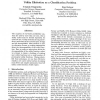Free Online Productivity Tools
i2Speak
i2Symbol
i2OCR
iTex2Img
iWeb2Print
iWeb2Shot
i2Type
iPdf2Split
iPdf2Merge
i2Bopomofo
i2Arabic
i2Style
i2Image
i2PDF
iLatex2Rtf
Sci2ools
112
click to vote
UAI
1998
1998
Utility Elicitation as a Classification Problem
The majority of real-world probabilistic systems are used by more than one user, thus a utility model must be elicited separately for each newuser. Utility elicitation is long and tedious, particularly if the outcomespace is large and not decomposable. Most research on utility elicitation focuses on makingassumptions about the decomposability of the utility function. Here we makeno assumptions about the decomposability of the utility function; rather we attempt to cluster a database of existing user utility functions into a small numberof prototypical utility functions. Having identified these prototypes, wecan then effectively classify a newuser's utility function by asking manyfewer and simpler assessments than full utility modelelicitation wouldrequire.
Related Content
| Added | 01 Nov 2010 |
| Updated | 01 Nov 2010 |
| Type | Conference |
| Year | 1998 |
| Where | UAI |
| Authors | Urszula Chajewska, Lise Getoor, Joseph Norman, Yuval Shahar |
Comments (0)

